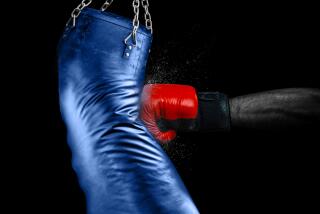Plays Down Fear of Religious Intrusion Into Government : Ex-Gov. Jerry Brown Says Not to Worry
Fear that religion is intruding into government has escalated in recent years with courtroom decisions against “secular humanism” textbooks, continued debate over abortion and school prayer, and the potential presidential candidacy of religious broadcaster Pat Robertson, among other issues.
But former California Gov. Edmund G. (Jerry) Brown Jr.--a “mellowed” Roman Catholic now actively engaged in Buddhist practice--says not to worry.
At least not for government, he told a panel on religion and politics last week at the American Bar Assn. convention in San Francisco.
Other Way Around
“The problem is not so much what government has to fear from religion, but what religion has to fear from government and politics,” he said.
“I have no doubt that as the two intertwine themselves, religion will be the bigger loser, and ultimately the country itself, for the lack of pristine, prophetic example which we depend on and which we look to for religious leaders to provide.”
Brown asserted that the impact of religion is watered down when it engages in “the mundane processes of government give and take, lobbying, campaign contributions, voter registration and the rest.”
The ex-governor’s own current focus includes seeking answers to what he sees as “the pervasiveness of the secular spirit and the decline of religious experience in America.”
Buddhist Conference
Brown this week attended a major Buddhist-Christian conference at the Graduate Theological Union in Berkeley that drew more than 600 people. Besides many U.S. Christian theologians, the conference attracted a large number of Buddhist teachers from East Asian countries, including Brown’s Zen Buddhist mentor from Japan, Kyozo Yamada.
Brown said that when he was on a five-day retreat with Yamada two weeks ago in Kamakura, Japan, he sat next to a Jesuit priest from Rome and a Swiss Jesuit who is the spiritual director for his order in that country.
Brown, in remarks to a reporter, claimed that the increasing contact between Buddhists and Christians represents a bigger ideological step than anything happening in politics, including the arms control hopes of President Reagan and Soviet leader Mikhail S. Gorbachev.
No official actions affecting either religion emerge from such conferences, but some say the teaching of Christianity is inevitably affected as theologians become more familiar with Buddhism’s views of ethics, justice, death and reincarnation, and are challenged philosophically by a ancient religion without a godhead.
Brown’s own spiritual odyssey, from his days as a Jesuit seminarian, also covers a great distance, as he admitted in his talk to the audience of lawyers and jurists.
“About the time when my father (Edmund G. Brown Sr.) was elected governor,” Brown said, “I wrote him a letter from the seminary cautioning him not to appear at the state prayer breakfast because it was basically a Protestant institution. And under the Catholic rules as I understood them, that would be joining in some kind of false worship.
“So I started from a somewhat dogmatic point of view and over years I’ve mellowed,” he said, drawing laughs from the audience. During his two-term governorship from 1975 to 1983, Brown was known for his interest in Eastern religious thought, although he rarely discussed the subject publicly.
He urged that those who are worried about the mix of religion and politics take a longer, historical view.
“When Ronald Reagan talks to the evangelicals, his religious rhetoric is no less than that of Abraham Lincoln in the second inaugural when he called for a day of prayer and fasting and a national confession of sin,” he said.
“In fact, in the state of California we have a statute that allows the governor to call for a day of fast, prayer and abstinence. I never did call for it; I didn’t think the Legislature would go along with it.”
Brown said the country benefits from the fact that the precise boundaries of church-state separation as reflected in U.S. Supreme Court decisions are always in flux. “There is no dogma that can interpret the establishment (and) free exercise clauses” of the First Amendment, he said.
More to Read
Get the L.A. Times Politics newsletter
Deeply reported insights into legislation, politics and policy from Sacramento, Washington and beyond. In your inbox three times per week.
You may occasionally receive promotional content from the Los Angeles Times.










